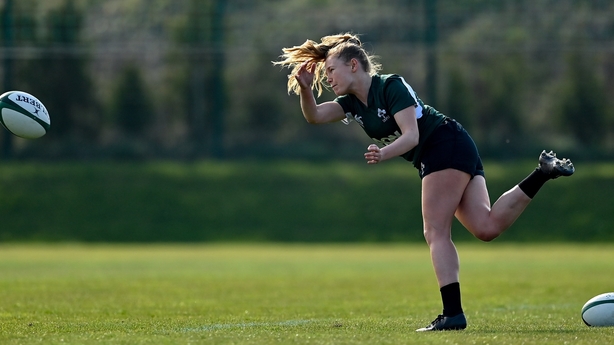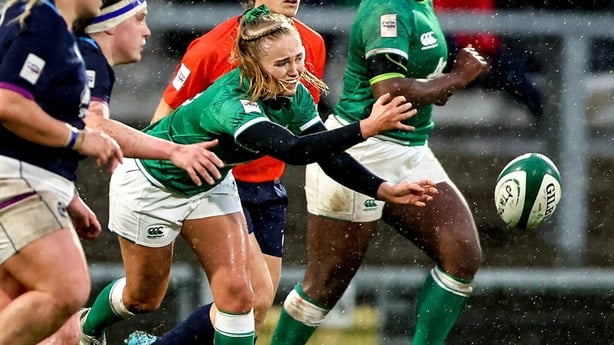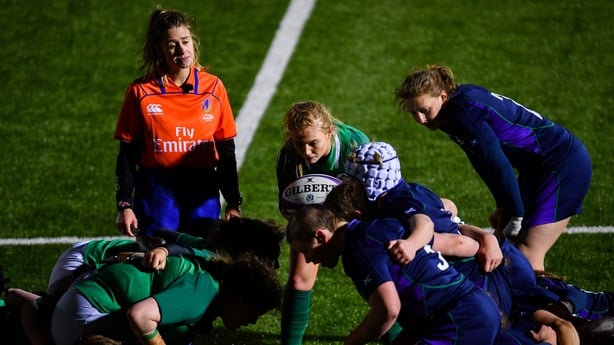Life isn't quite back to normal for Kathryn Dane, but it’s as normal as it can be.
Just under nine months on from suffering a brain haemorrhage while training with Ireland, the Ulster and Old Belvedere scrum-half is still some way off making a full return to rugby, although her progress has been significant.
The Fermanagh native is back full-time at the IRFU high performance centre in Dublin doing gym work, which is being constantly monitored, while she hopes to get back running in the next four or five weeks.
News of Dane’s brain haemorrhage emerged in February when she shared details of her recovery on Instagram, having become unwell while doing a gym session with the Irish squad’s S&C coach Ed Slattery.
"It was just a normal day of training, I was rehabbing an ACL injury I had," the 14-cap scrum-half says, as she reflects on the day she fell ill.
"I just got this massive pain behind my right eye in the back of my head. I didn't feel great, but up until that point I was 100%, I was feeling fine.
"Ed [Slattery] noticed straight away that my face had dropped. I didn't notice it had dropped, but I didn't feel great and he quickly got the team doc - who was actually in the gym at the time - to have a look at me, and they knew straight away I'd had a stroke of some description.
"I went to the medical room, lots of reassurance, they got me an ambulance and I think I was in Connolly hospital within around 15 minutes, which was really lucky."
The exact cause of the haemorrhage, Dane says, is known as arteriovenous malformation (AVM), something the 26-year-old was born with but didn’t realise she had.
As a chartered physiotherapist, the 26-year-old's medical knowledge was both a help and a hindrance, she says. Having recognised the symptoms she was showing, it allowed her to react rationally and faster than the average person. On the flip side, it made her all too aware of what was ahead of her.

"It was scary and a bit shocking at the time, but with my physio background I knew what was happening, but it wasn't confirmed until I got to hospital that it was haemorrhage from a thing called an AVM that I was born with but didn't know about it until it burst.
"It's just a malformation of blood vessels that people can be born with or develop. It's a vulnerable vessel that, under high pressure and high strain, can burst.
"I knew exactly what was happening. I’d treated patients with strokes in the past as a physio, not in the crazy acute stage that I was in, but it did help.
"I also then remembered patients who’d had multiple strokes from the exact same thing and I thought 'Oh, is my life going to look like that? I don’t want to be one of those people who has to keep looking over my shoulder.’
"It is beneficial to have that knowledge but at the same time ignorance is bliss sometimes!"
The where and the when of this story is also crucial to how quickly Dane was treated.
"To be honest, it wasn't until two or three months after that I actually started to digest and process it. That was really, really emotional and difficult to come to terms with."
As one of the Ireland internationals who took on a full-time contract in the women’s XV programme in November, Dane was just a few weeks into her new life as a professional rugby player.
Had the haemorrhage occurred on her own rather than at the IRFU facility, where there were medical professionals on hand to treat her immediately, she says the outcome could have been much different.
"The speed at which the thing took hold was incredible. I think I had immediate left-sided weakness, I needed help to get myself off the gym floor into the medical room, so thank God I wasn't on my own on a gym floor, that I had been in the HPC which is so close to Connolly and Beaumont hospital where I needed the treatment straight away.

"It was so fortunate it happened where it happened. It was scary and a bit shocking at the time.
"I'm so, so thankful for being involved and being here at the time. I would have had a totally different outcome, and as you know with these things, time is everything."
Once the shock wore off, the reality of what would be a slow recovery set in.
First, there was the restlessness of being restricted in hospital, which she had to endure for two weeks before being allowed home. Then there was the sleeplessness and headaches, which were amplified by the weight of emotion from the experience.
"The emotional processing of what had happened was probably the biggest step for me," she adds.
"To be honest, it wasn't until two or three months after that I actually started to digest and process it. That was really, really emotional and difficult to come to terms with.
"I was just in survival mode, trying to sleep and eat and recover as much as I can, and I don't know whether it's the elite athlete in me, but we're not used to making time for the emotional processing of these big injuries. That was probably the biggest step in my recovery."
"Since the stroke I've realised, when you’re in those dark places you start to see all the light you have in your life."
There are only so many TV shows and movies to dive into, and so she couldn’t get back to her PhD work quick enough, where she’s studying the injury effects of tackling in women’s rugby.
"I was told I could walk short distances and do very light cognitive tasks, which obviously a PhD doesn't fall under but I wasn't telling them that," she laughs.
"In terms of the PhD, it's been a massive distraction for me. I've not been able to stay idle for any length of time throughout this recovery. Thankfully my supervisors know me only too well so they let me continue my work.

"I looked this morning, I've published three papers since it happened in November so I really have been keeping the whole thing going.
"I'm so grateful that I have that to be a difference off the field for women in terms of that tackle research that I'm doing. It's frustrating not being on the pitch but I know I can make a difference off the pitch in a way."
Given the risk of a re-bleed, progress is still "day by day, week by week".
It was close to four months on from the haemorrhage when she could complete any cardiovascular training, which she says was strictly supervised.
Returning to rugby remains the goal, but the timeframe for doing that is yet to be decided.
"In terms of life right now I'm doing my PHD, I'm full-time contracted here in training with the girls, and socialising and living life as full as possible. I'm doing really, really well, considering.
"I think I was told the whole time by the medical teams, 'don't rush back into things, don't feel like you're taking too long to reintegrate into stuff'. I think they're all shocked and surprised how well I've coped and adapted into the programme.
"Before, I used to go through life at 100 miles-an-hour, not really appreciate the good things or achievements or learnings that I’ve had.
"Since the stroke I’ve realised, when you’re in those dark places you start to see all the light you have in your life. For me I have an incredible army of friends, teammates and family around me that are just incredible and it shows you the strength that you have in numbers.
"I have so many opportunities through sport and my PhD that I never really appreciated before.
"Now I’m going to be properly grateful for what I have and enjoy rugby and all the moments that I have. I think I did take it for granted before."


